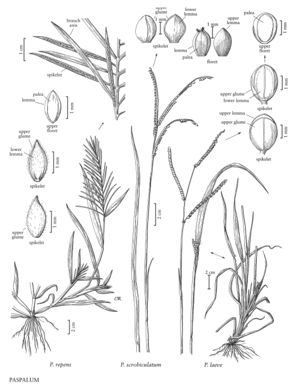Paspalum laeve
Plants perennial; shortly rhizomatous. Culms 40-120 cm, erect; nodes glabrous or pubescent. Sheaths glabrous or pubescent; ligules 1.5-3.8 mm; blades to 37 cm long, 2-9.3 mm wide, flat, glabrous or pubescent. Panicles terminal, with 1-6 racemosely arranged branches; branches 2-10.9 cm, diverging to spreading (rarely erect), persistent; branch axes 0.6-1.3 mm wide, glabrous, margins scabrous, terminating in a spikelet. Spikelets 2.3-3.3 mm long, 2-2.7 mm wide, solitary, appressed to the branch axes, elliptic to obovate or nearly orbicular, glabrous, stramineous. Lower glumes absent; upper glumes 3-veined, lower lemmas 5-veined; upper florets pale to stramineous. Caryopses about 2 mm, white to yellow-brown. 2n = 20, 58, 70, 80.
Distribution
Del., D.C., W.Va., Fla., N.J., Tex., La., Tenn., N.Y., Pa., Va., Ala., Ark., Ill., Ga., Ind., Conn., Md., Kans., Okla., Mass., Ohio, Mo., Mich., Miss., Ky., N.C., S.C.
Discussion
Paspalum laeve is restricted to the eastern United States. It grows at the edges of forests and in disturbed areas.
Selected References
None.
